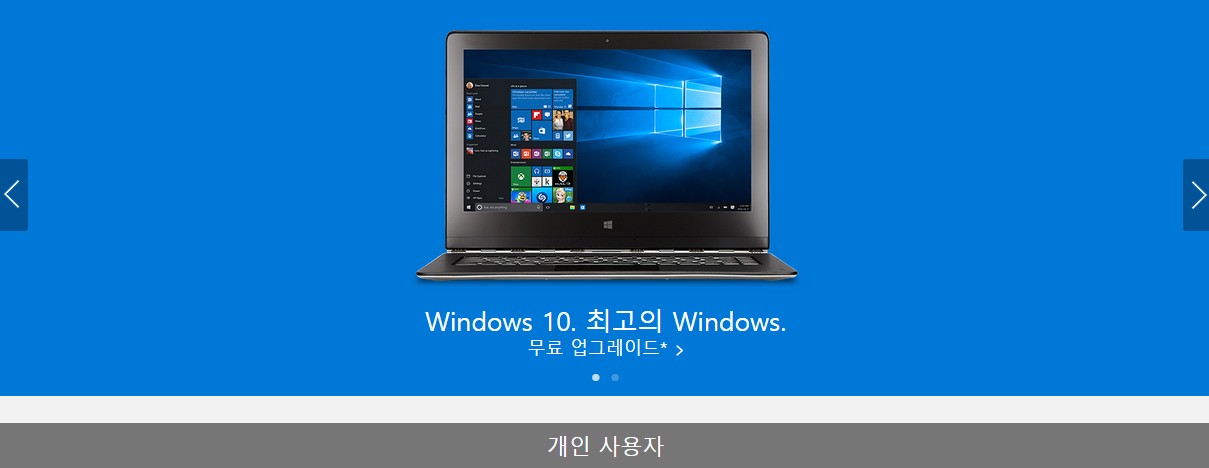
American tech giant Microsoft apparently has some explaining to do to Korean Windows users.
That’s because a television commercial announcing the recent release of Microsoft Windows 10, the latest and blessedly less-infuriating edition of the company’s flagship operating system, apparently commits an unwritten faux pas by way of a text font displayed in the ad.
And if you’re as baffled as we initially were about how a simple, commonly used font could be so offensive, well, let us tell you a little story about Japan-Korea relations…
See, Japan kind of has a way of angering most of its East Asian neighbors – largely through its cavalier and sometimes revisionist attitude about certain war atrocities that we won’t get into here – so hating Japanese goods and pop culture tends to come in and out of vogue in places like China and Korea.
And it just so happens that one of the Japanese products that certain folks in Korea are boycotting is the once popular and very common computer text font, Gulim, which was apparently designed in Japan.
It’s unclear how long the movement to boycott said font has been going on, or what spurred it; whether the font was recently outed as a Japanese product or whether the commercial just happened to come around when particular circles of Korean Windows users were particularly angry at Japan.
Anyway, if you think getting worked up about a font is, well, kind of dumb, rest assured you’re not alone. A lot of Korean Netizens are equally baffled by this hatred of what is essentially just some slightly differently shaped text, commenting:
“I don’t see the problem. Gulim has been the Windows default font forever.”
“Korea is infamous for software pirating. It’s no wonder Microsoft isn’t going out of their way for us!”
“People complaining about a stupid font just have a weird victim complex.”
“Turns out Korea isn’t the center of the universe after all!”
On the flipside, those not on Team Gulim point out that changing a font is super simple and Microsoft sticking with the font for the commercial indicates a lack of cultural awareness that a huge, multinational corporation has no excuse for. Others also point out that Google made a similar faux pax in the past despite purporting to be dedicated to the Korean market.
Regardless, there’s certainly a lot of cultural and economic exchange going on between Korea and Japan, so the two countries’ relationship is, we guess, more “frenemy” than “mortal adversaries,” indicating that probably those complaining about a font – of all things – are a small but vocal minority.
We trust our fine readers will keep the comments section civil here, lest we be forced to admonish you in Comic Sans.
Source: Focus-Asia/Yahoo! News Japan
Screenshots via Microsoft


 Lawson adds doughnuts to its convenience store sweets range, but are they good enough to go viral?
Lawson adds doughnuts to its convenience store sweets range, but are they good enough to go viral? Death Spray from Japan causes buzz online for powerful ability to cut ties with bad energy
Death Spray from Japan causes buzz online for powerful ability to cut ties with bad energy Viral Japanese cheesecake from Osaka has a lesser known rival called Aunt Wanda
Viral Japanese cheesecake from Osaka has a lesser known rival called Aunt Wanda Nintendo’s controller capsule toys are so cool, even the machine you buy them from is awesome【Pics】
Nintendo’s controller capsule toys are so cool, even the machine you buy them from is awesome【Pics】 Family Mart ups its convenience store food game with special burger from beef bowl chain Matsuya
Family Mart ups its convenience store food game with special burger from beef bowl chain Matsuya Lawson adds doughnuts to its convenience store sweets range, but are they good enough to go viral?
Lawson adds doughnuts to its convenience store sweets range, but are they good enough to go viral? Death Spray from Japan causes buzz online for powerful ability to cut ties with bad energy
Death Spray from Japan causes buzz online for powerful ability to cut ties with bad energy Viral Japanese cheesecake from Osaka has a lesser known rival called Aunt Wanda
Viral Japanese cheesecake from Osaka has a lesser known rival called Aunt Wanda Nintendo’s controller capsule toys are so cool, even the machine you buy them from is awesome【Pics】
Nintendo’s controller capsule toys are so cool, even the machine you buy them from is awesome【Pics】 Family Mart ups its convenience store food game with special burger from beef bowl chain Matsuya
Family Mart ups its convenience store food game with special burger from beef bowl chain Matsuya Eat Kuroge Wagyu beef at this Japanese restaurant in Ginza for less than 10 bucks!
Eat Kuroge Wagyu beef at this Japanese restaurant in Ginza for less than 10 bucks! Japan’s craziest burger chain takes menchi katsu to new extreme levels
Japan’s craziest burger chain takes menchi katsu to new extreme levels Haneda Market: Tokyo Station conveyor belt sushi restaurant is special on two days of the week
Haneda Market: Tokyo Station conveyor belt sushi restaurant is special on two days of the week Chance to play Teris on a massive staircase in Kyoto Station coming in March
Chance to play Teris on a massive staircase in Kyoto Station coming in March Japanese drink vending machine capsule toys: A must-have for recreating Japan in miniature
Japanese drink vending machine capsule toys: A must-have for recreating Japan in miniature Starbucks Japan releases first-ever Hinamatsuri Girls’ Day Frappuccino
Starbucks Japan releases first-ever Hinamatsuri Girls’ Day Frappuccino Japanese restaurant chain serves Dragon Ball donuts and Senzu Beans this spring
Japanese restaurant chain serves Dragon Ball donuts and Senzu Beans this spring Highest Starbucks in Japan set to open this spring in the Tokyo sky
Highest Starbucks in Japan set to open this spring in the Tokyo sky Japan Extreme Budget Travel! A trip from Tokyo to Izumo for just 30,000 yen [Part 1]
Japan Extreme Budget Travel! A trip from Tokyo to Izumo for just 30,000 yen [Part 1] Japan has only one airport named after a samurai, so let’s check out Kochi Ryoma【Photos】
Japan has only one airport named after a samurai, so let’s check out Kochi Ryoma【Photos】 Japan Extreme Budget Travel! A trip from Tokyo to Izumo for just 30,000 yen [Part 2]
Japan Extreme Budget Travel! A trip from Tokyo to Izumo for just 30,000 yen [Part 2] Japanese drugstore sells onigiri at pre-stupid era prices, but how do they compare to 7-Eleven?
Japanese drugstore sells onigiri at pre-stupid era prices, but how do they compare to 7-Eleven? Yakuzen ramen restaurant in Tokyo is very different to a yakuza ramen restaurant
Yakuzen ramen restaurant in Tokyo is very different to a yakuza ramen restaurant Tokyo Skytree turns pink for the cherry blossom season
Tokyo Skytree turns pink for the cherry blossom season Japan’s newest Shinkansen has no seats…or passengers [Video]
Japan’s newest Shinkansen has no seats…or passengers [Video] Starbucks Japan releases new sakura goods and drinkware for cherry blossom season 2026
Starbucks Japan releases new sakura goods and drinkware for cherry blossom season 2026 Foreigners accounting for over 80 percent of off-course skiers needing rescue in Japan’s Hokkaido
Foreigners accounting for over 80 percent of off-course skiers needing rescue in Japan’s Hokkaido Super-salty pizza sends six kids to the hospital in Japan, linguistics blamed
Super-salty pizza sends six kids to the hospital in Japan, linguistics blamed Starbucks Japan unveils new sakura Frappuccino for cherry blossom season 2026
Starbucks Japan unveils new sakura Frappuccino for cherry blossom season 2026 Foreign tourists in Japan will get free Shinkansen tickets to promote regional tourism
Foreign tourists in Japan will get free Shinkansen tickets to promote regional tourism The 10 most annoying things foreign tourists do on Japanese trains, according to locals
The 10 most annoying things foreign tourists do on Japanese trains, according to locals Take a trip to Japan’s Dododo Land, the most irritating place on Earth
Take a trip to Japan’s Dododo Land, the most irritating place on Earth Naruto and Converse team up for new line of shinobi sneakers[Photos]
Naruto and Converse team up for new line of shinobi sneakers[Photos] Is China’s don’t-go-to-Japan warning affecting the lines at a popular Tokyo gyukatsu restaurant?
Is China’s don’t-go-to-Japan warning affecting the lines at a popular Tokyo gyukatsu restaurant? Survey asks foreign tourists what bothered them in Japan, more than half gave same answer
Survey asks foreign tourists what bothered them in Japan, more than half gave same answer Japan’s human washing machines will go on sale to general public, demos to be held in Tokyo
Japan’s human washing machines will go on sale to general public, demos to be held in Tokyo Starbucks Japan releases new drinkware and goods for Valentine’s Day
Starbucks Japan releases new drinkware and goods for Valentine’s Day We deeply regret going into this tunnel on our walk in the mountains of Japan
We deeply regret going into this tunnel on our walk in the mountains of Japan Studio Ghibli releases Kodama forest spirits from Princess Mononoke to light up your home
Studio Ghibli releases Kodama forest spirits from Princess Mononoke to light up your home Major Japanese hotel chain says reservations via overseas booking sites may not be valid
Major Japanese hotel chain says reservations via overseas booking sites may not be valid Put sesame oil in your coffee? Japanese maker says it’s the best way to start your day【Taste test】
Put sesame oil in your coffee? Japanese maker says it’s the best way to start your day【Taste test】 No more using real katana for tourism activities, Japan’s National Police Agency says
No more using real katana for tourism activities, Japan’s National Police Agency says Eat Kuroge Wagyu beef at this Japanese restaurant in Ginza for less than 10 bucks!
Eat Kuroge Wagyu beef at this Japanese restaurant in Ginza for less than 10 bucks! Japan’s craziest burger chain takes menchi katsu to new extreme levels
Japan’s craziest burger chain takes menchi katsu to new extreme levels Haneda Market: Tokyo Station conveyor belt sushi restaurant is special on two days of the week
Haneda Market: Tokyo Station conveyor belt sushi restaurant is special on two days of the week Chance to play Teris on a massive staircase in Kyoto Station coming in March
Chance to play Teris on a massive staircase in Kyoto Station coming in March Japanese drink vending machine capsule toys: A must-have for recreating Japan in miniature
Japanese drink vending machine capsule toys: A must-have for recreating Japan in miniature Japanese panty thief steals over 700 pieces of underwear from coin laundry before finally caught
Japanese panty thief steals over 700 pieces of underwear from coin laundry before finally caught Slouching too much? Can’t sleep comfortably at work? Get yourself a helping hand!
Slouching too much? Can’t sleep comfortably at work? Get yourself a helping hand! The best Hobonichi diaries, covers and stationery for 2026
The best Hobonichi diaries, covers and stationery for 2026 KFC becomes KFCheese with new pie and raclette “drowning” burger in Japan
KFC becomes KFCheese with new pie and raclette “drowning” burger in Japan Sleep in a futuristic space pod at this interstellar capsule hotel just outside of Tokyo
Sleep in a futuristic space pod at this interstellar capsule hotel just outside of Tokyo Eight unforgettable hot springs, as recommended by Japan’s “Professor Bath”
Eight unforgettable hot springs, as recommended by Japan’s “Professor Bath” Ramen for 99 yen?!? Best value-for-money noodles found at unlikely chain in Japan
Ramen for 99 yen?!? Best value-for-money noodles found at unlikely chain in Japan Japanese movie theater chain’s popcorn earns highest Grand Prix quality certification
Japanese movie theater chain’s popcorn earns highest Grand Prix quality certification